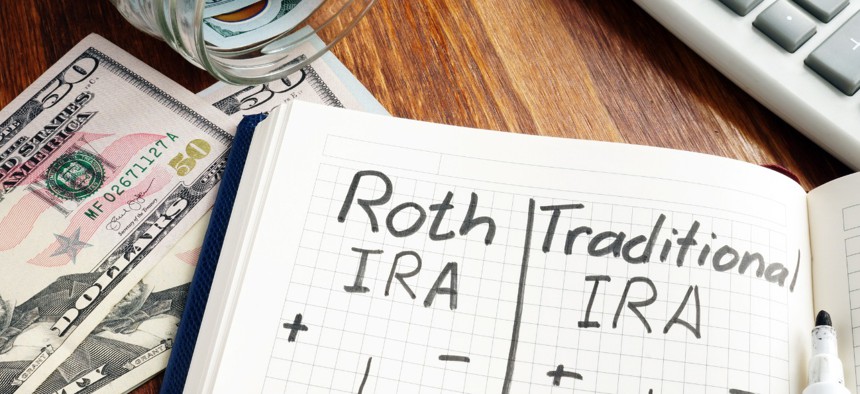
designer491 / istock
I talk to people about money and taxes all day long and I have yet to talk to someone who wants to pay more in taxes. We all should want to pay our fair share of taxes but not many of us also want to leave a tip.
That is why it is so crucial to have a great tax strategy in retirement to make sure you can minimize your taxes as much as you legally can.
But if you do want to leave the government a tip, then feel free to donate towards the national debt here :)
Different Tax Buckets
There are 3 main tax buckets you can have. There are pay-as-you-go buckets, pay-later buckets, and pay-never buckets.
The pay-as-you-go buckets include non-retirement investments such as a brokerage account. In these accounts you pay taxes as you receive dividends or sell investments for a profit.
The one advantage of this bucket is that it can be subject to long term capital gains tax rates which are always lower than your normal tax rates. The downside is that you have to pay taxes as you go and not just when you take money out of the account.
The pay-later bucket can be a traditional IRA, traditional Thrift Savings Plan account, or traditional 401(k) savings account. Basically, you get a tax deduction for putting money into this bucket, it grows tax-deferred, and you don’t have to pay taxes until you take it out of the account.
But out of the 3 types of tax buckets, the pay-never bucket is certainly my favorite. This bucket includes Roth IRAs, the Roth TSP, and Roth 401(k)s. Basically, you put after-tax money into this bucket and it can grow tax-free. Then when you take the money out, both what you originally contributed and the growth can all come out without paying a dime in taxes.
If getting tax-free growth isn’t enough to convince you to start a Roth IRA (or other Roth account), here are five more benefits:
1. Avoid Required Minimum Distributions
Beginning at age 72, you are required to start taking money out of certain types of retirement accounts. For example, if you have a traditional TSP or traditional IRA, RMDs mean you will have to take a certain percentage of these accounts every year—money that you have to pay taxes on.
However, the one type of retirement account that is not subject to RMDs is a Roth IRA. This means you can keep your money in a Roth IRA for as long as you’d like and it will continue to grow tax-free.
2. Create a Hedge Against Higher Taxes
It is hard to know what changes will be made to the tax law in the future but most people are in agreement that tax rates are most likely not going to go down any time soon. So if taxes are higher in the future, paying taxes now at a lower rate (by using a Roth account) can be a great way to reduce your tax burden over the long run.
3. Lower Medicare Part B Premiums
Medicare is a big part of retirement for the vast majority of Americans and Medicare part B is not free. You can find the current premiums here. The cost of Medicare part B increases as your income does. That means if you have income over certain thresholds, your premiums will increase.
Money that you take out of pre-tax accounts (traditional IRA, traditional TSP, and traditional 401(k), for example) counts as taxable income when you withdraw it, so taking too much out in one year could increase your premiums. But money taken out of a Roth IRA does not count as taxable income—in other words, having Roth money can help you save thousands of dollars in Medicare premiums.
4. Reduce Taxes for Your Kids
Having Roth money is not only good for you but is also good for those you leave money to in your will. If you die and leave a traditional IRA to your kids, they will have to pay taxes whenever they take money out of the account. But if you leave them a Roth IRA, they will be able to access it tax and penalty-free.
5. You’ll Have More Control Over Your Finances
The last reason to have some after-tax money in retirement is to have more options in retirement. After all, we don’t know what tax laws are going to look like in the future but having money in a variety of tax buckets will give you some amount of control over your taxable income throughout retirement.






